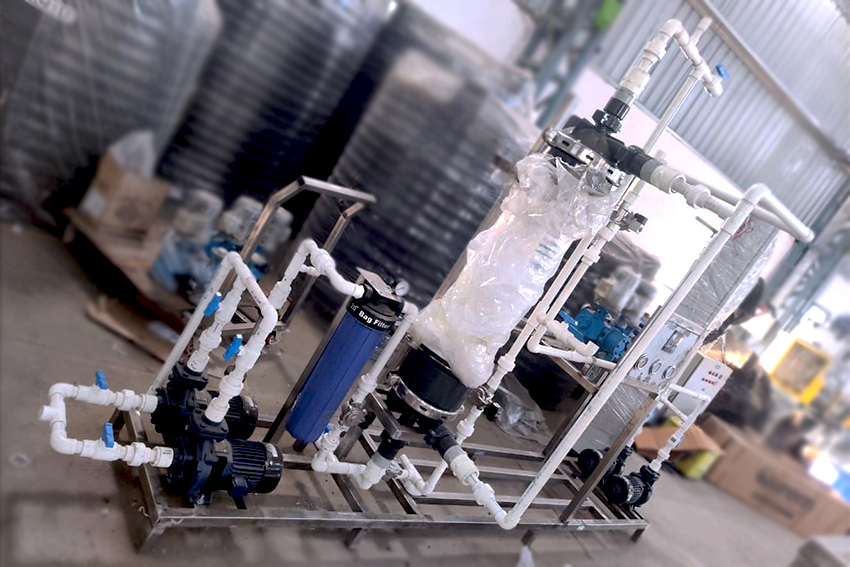Introduction
In industries where water purity is critical, a DM Water Plant plays a vital role in ensuring reliable, high-quality, deionized water. At SDES, we offer custom-designed DM Water Plants that remove dissolved salts and minerals using ion exchange technology. These systems are essential for sectors like pharmaceuticals, power generation, textiles, and electronics where even trace minerals can affect quality and efficiency.
What is a DM Water Plant?
A Demineralization (DM) Water Plant is an industrial system that purifies water by removing dissolved minerals and ions such as calcium, magnesium, sodium, chloride, sulfate, and nitrate. It uses ion exchange resins to produce deionized water—a pure form of water used in various critical applications.
What is a Water Softener?
Hard water is a common issue in many households and industries, often causing scale buildup, poor soap performance, and damage to plumbing. The most efficient way to solve this is by using water softeners. These systems are designed to remove minerals like calcium and magnesium, which are responsible for water hardness, thus providing clean, soft, and usable water.
A water softener is a filtration system that eliminates hardness-causing minerals from water through a process called ion exchange. Hard water contains high levels of calcium and magnesium ions, which are replaced with sodium or potassium ions in the softening process.
This not only improves water quality but also extends the life of appliances and plumbing systems.
Applications of DM Water:
- Boiler feed water
- Cooling systems
- Laboratory water supply
- Pharmaceuticals and chemical processing
- Electronics and semiconductors
- Food and beverage production
How Does a DM Water Plant Work?
The DM plant working principle is based on ion exchange where cations and anions are removed through resin columns.
1. Cation Exchange Unit (CEU)
The water first passes through the cation resin column, where positively charged ions like calcium, magnesium, and sodium are exchanged with hydrogen ions (H⁺).
2. Anion Exchange Unit (AEU)
Next, the water enters the anion resin column, where negatively charged ions like chloride, sulfate, and nitrate are exchanged with hydroxide ions (OH⁻).
3. Mix Bed Polisher (Optional)
For ultra-pure water, a mixed bed unit with a combination of cation and anion resins provides final polishing to ensure very low conductivity and TDS levels.
The end result is deionized water with high purity, typically used in sensitive industrial processes.
Advantages of SDES DM Water Plants
At SDES, we offer turnkey DM plant solutions with:
- Compact, space-saving designs
- Fully automatic or manual operation options
- Corrosion-resistant FRP, MSRL, or SS construction
- High-quality ion exchange resins
- Low maintenance and long service life
Types of Water Softeners
1. Salt-Based Softeners
These are the most common and effective at removing calcium and magnesium ions. They use salt for regeneration and are ideal for households with very hard water.
2. Salt-Free Softeners
Also known as water conditioners, these don’t remove minerals but prevent them from forming scale. They are low maintenance and eco-friendly.
3. Dual-Tank Softeners
Perfect for large families or industrial setups, these systems ensure an uninterrupted soft water supply by alternating between two tanks.

Our systems are built to handle various flow rates and TDS levels while delivering consistent purity and performance.
- Explore our Water Treatment Plants
- Contact Us for a Free Assessment
Comparison: DM Plant vs RO Plant
| Parameter | DM Water Plant | RO Water Plant |
|---|---|---|
| Technology | Ion Exchange | Membrane Filtration |
| Water Recovery | High (80–90%) | Moderate (40–70%) |
| Removes | Dissolved ions and salts | Dissolved solids, bacteria |
| Ideal for | Boiler feed, labs, electronics | Drinking water, process water |
| Energy Consumption | Low | Moderate |
For ultra-pure needs, DM plants are preferred. For broader purification, RO plants are more versatile. SDES helps you choose the right system based on your water quality and usage.
Operation & Maintenance of DM Plants
Our expert team provides full Operation & Maintenance (O&M) services for your DM Water Plant:
- Resin regeneration with acid and alkali
- Conductivity and pH monitoring
- Pump and valve inspections
- Timely resin replacement and column servicing
Learn about our O&M Services
Why Choose SDES for DM Water Plant Solutions?
- Over a decade of experience in industrial water treatment
- Custom-built plants to meet industry-specific needs
- End-to-end support: from design to commissioning
- Reliable after-sales service and O&M
- Use of top-grade ion exchange resins and automation systems
Industries We Serve
- Pharmaceutical & Chemical
- Textile & Dyeing Units
- Food & Beverage
- Power Plants & Boiler Systems
- Electronics & Manufacturing Units
Conclusion
A DM Water Plant is essential for industries that rely on pure, mineral-free water. At SDES, we deliver high-performance Demineralization Plants that meet the strictest quality and environmental standards. Whether you need a compact plant or a large-scale system, we offer cost-effective, reliable, and fully customized solutions for your water purification needs.
Water softeners offer a reliable and long-term solution to hard water problems. Whether you’re looking to protect your appliances, improve water quality, or enjoy better hygiene, installing the right softener system makes a huge difference.
From residential use to commercial applications, softening systems are a key component of water treatment solutions. Make sure to evaluate your water hardness level and choose the appropriate type for maximum benefit.
Looking for a DM Water Plant that matches your process?
→ Get in Touch with SDES Today